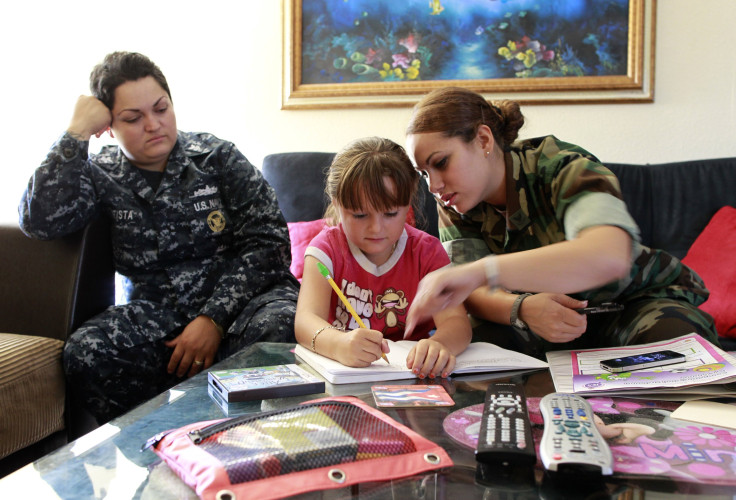US Military Same-Sex Couples Denied Benefits As Pentagon Yet To Reach Deals With Overseas Host Countries

Even as gay rights protections spread across the United States, one frontier remains largely untouched -- the overseas posts occupied by American military personnel.
While the "Don't Ask, Don't Tell" ban on openly gay servicemen has been repealed, and military personnel can marry same-sex partners in some states now, the protections that they have recently gained in the U.S. generally do not apply in the foreign countries that host them.
The top 10 locations of U.S. service members abroad collectively host 151,000 troops, but only three, Spain, the U.K. and Japan, accounting for 61,000 military and 8,300 dependents, allow same-sex benefits, while some others explicitly bar same-sex couples from gaining those benefits, such as rent allowance, moving costs and visa guarantees. That means that some military spouses have been forced to leave the host country after 90 days because they were not allowed a visa to stay longer. This has led to concerns about the families being split up.
“Families are being separated or will be separated come this summer, families with kids,” said Ashley Broadway, of the American Military Partner Association, told Stars and Stripes in an interview in March.
“This is happening to people of all ranks, but especially lower enlisted, who are afraid to speak up about this issue and ask to have their orders changed,” Broadway said. Some have sought help from military lawyers or inspectors general, she said, but to no avail. “No one seems to know what to do, really,” she said.
To address the issue, the military is working with the State Department and host nations to strike a balance between the rights of same-sex couples in the U.S. military and their own laws, said LCDR Nathan Christensen, a spokesman at the Defense Press Office for personnel and readiness.
As a matter of course, the United States negotiates so-called Status of Forces Agreements with the countries that host American troops, laying out such topics as legal jurisdiction, tax responsibilities and employment rights.
When American personnel and their same-sex spouses are denied benefits by dint of being posted abroad to a country that does not recognize same-sex marriage, the U.S. government could reimburse them for the losses under a different system, the overseas benefits and allowances program. But rather than applying this course, defense officials say they would prefer to follow the rules under existing arrangements negotiated by the U.S. and host nations.
According to a DOD spokesperson, 16 countries have now agreed that they will allow command sponsorship of same-sex spouses. This will allow same-sex spouses to be assigned as dependents to Japan, the UK and Spain, representing around 61,000 military personnel and 8,300 dependents. A further 13 countries that have allowed the benefits make up another 1,500 military and 650 dependents.
Notably, Germany, Italy and South Korea, which together host around 79,500 U.S. military personnel and 11,000 dependents, don’t allow gay and lesbian U.S. service personnel the same benefits as their brothers and sisters in arms, according to documents obtained from the Defense Department’s Statistical Information and Analysis Division. Italy and Germany, with about around 51,000 service men and women and 8,000 dependents, together represent 63 percent of the U.S. European Command.
The U.S. is pushing back against the host nation policies in some instances, notably in Korea, where the U.S. has maintained a large presence for more than 50 years since the Korean War ended. It has sought to resolve the issue quickly and without seeking host nation approval.
In South Korea, American commanders pushed ahead without an agreement, instead writing a letter informing the Seoul government it was moving ahead unilaterally to provide full benefits to same-sex dependents of troops, civilian employees and contractors.
In a March statement, the United States Forces Korea said, “It is our hope that the Republic of Korea’s government will understand and respect the U.S. government’s decision.”
While benefits will now be forthcoming for same-sex spouses, the U.S. government cannot guarantee that the Koreans will issue the A-3 visa for entry of those spouses as the two nations have not reached a formal SOFA.
In Japan, where same-sex marriage is not legal but also not a political issue, the government allowed the term “spouse” to mean any person married to a Defense Department employee, U.S. Forces Japan Officials said.
Stories of SOFA cards being withdrawn in Germany after being mistakenly handed out to same-sex spouses have caused the most confusion. After withdrawal of the SOFA card and benefits, the military member and spouse are left without the same benefits enjoyed by heterosexual couples, namely the rent allowance and the visa.
It also means the spouse has just 90 days to remain in the country before being forced to leave, potentially splitting up a family and leaving one person to cover a more expensive rent.
A further 16 countries have stated that they will absolutely not allow command sponsorship of same-sex spouses -- Bangladesh, Sri Lanka, Guyana, Paraguay, Angola, Botswana, Mauritania, Tunisia, Comoros, Djibouti, Kenya, Liberia, Madagascar, Mauritius, Nigeria and Seychelles. But they represent only 194 personnel with 113 dependents.
While the United States does have a military presence in 181 countries worldwide, information obtained from the Department of Defense only alluded to deals noted above. Bahrain, Turkey, Guam, Belgium, Portugal and Philippines, representing around an additional 15,100 military personnel and 1,300 dependents, have also yet to make a decision on whether they will extend benefits to same-sex military personnel and spouses, according to a Defense spokesperson.
© Copyright IBTimes 2024. All rights reserved.






















